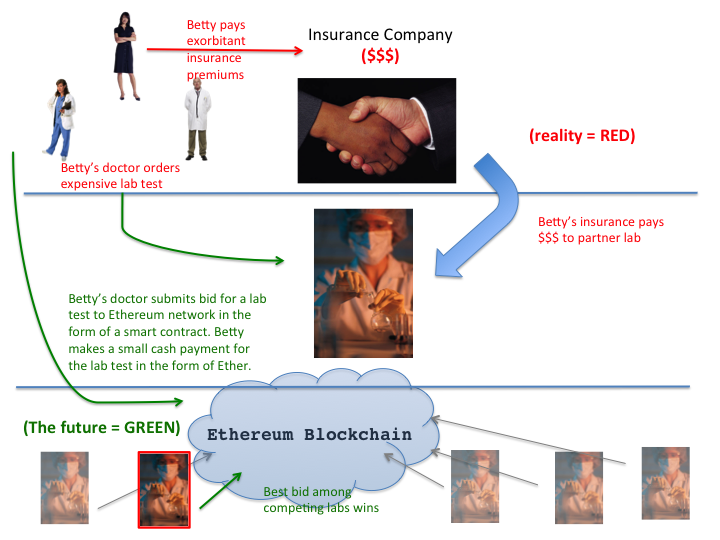Since Ethereum’s conception, I’ve dreamed of a blockchain-based healthcare services economy and presented the idea at BitTorrent’s headquarters 3 years ago. It’s also taken me that long to conceive of a concrete study of this protocol’s readiness for the limelight. With Ethereum’s adoption by a number of blue chip companies, including JP Morgan and Microsoft, its inevitability is clear. While still unreachably abstract to many people, I believe that healthcare’s state of disarray is a perfect environment to test the waters. As I get ready to start a Clinical Informatics fellowship at UCSF Medical Center, I’m prototyping such a blockchain-based health services marketplace and would like to humbly present the proposal to the Ethereum community for its feedback.
Pricing for healthcare services is currently based on prices determined by insurance companies’ ability to negotiate price points with groups of healthcare providers, individual providers, and healthcare systems. The lack of a true free market, and insurance companies’ administrative overhead, contribute to inflated prices for healthcare services across the board. [Figure 1: Health services marketplace in the blockchain era]

Figure 1: Health services marketplace in the blockchain era. Red text indicates how things work presently. Green indicates how things might work in a health services economy founded on the Ethereum blockchain. Notice the absence of insurance companies in the latter, hypothetical scenario. Their role has yet to be determined. I use laboratory testing as an example, but this would apply to imaging studies, office visits, surgical procedures, and consultations.
Enter Ethereum, a next-generation blockchain protocol for automatically executing “smart contracts.” Autonomously executed contracts obviate the need for escrow, attorneys, and administrators. Like Bitcoin’s protocol, Ethereum is a distributed blockchain that is open source, not owned by anyone, and runs off any and all computers running the client software. Ethereum’s novelty – and power – lies in the fact that it’s a Turing-complete system. Ethereum, unlike Bitcoin has mechanisms for executing logic, so smart contracts can be written by anyone, hosted on the Ethereum blockchain, and anyone in the world can interact with these contracts with the endpoint of manipulating data and moving money in the form of Ether (also a cryptocurrency).
So why not harness the Ethereum protocol to create a distributed, open source healthcare marketplace? Without administrative overhead (which accounts for the majority of an insurance company’s expenses, which are then passed on to patients and healthcare systems) and with the freedom for any provider of healthcare services to bid for a service (imaging, lab testing, consultations, procedures…), I hypothesize that the cost of healthcare services will be reduced to approximately 10% of its current artificially inflated price. Further contributing to cost and redundancy of healthcare expenditures is data siloing, the isolation of data on servers without APIs to set them free. Many healthcare providers will agree that it’s often much easier to repeat an expensive study than obtain records of that same procedure performed at an outside hospital (even if the study was just performed hours or days ago, and oftentimes, even if the study was performed at an affiliated hospital!). Ethereum’s distributed blockchain is a global ledger of everyone’s health information. I predict that sound security protocols, which need to be developed with healthcare’s unique needs in mind, will necessitate the use of biometric data to associate data on the blockchain with individuals.
So, how can we test the former hypothesis, that Ethereum can reduce the cost of healthcare services to 10% of their current prices?
I propose simulating such a bidding system to start collecting data on the free market prices Ethereum will foster by surveying physicians based in the community, as well as groups contracting with academic medical centers. If I survey Dr. Roentgen, Dr. Tomo, and Dr. Houndsfield (and a few hundred other radiologists) asking them if they would accept $X cash payment for imaging study A, B, or C (e.g. chest x-ray, mammogram, brain MRI…) performed STAT, tomorrow, or next month, we will start to approach theoretical market price for these studies.
If you are a fellow Ethereum developer or are otherwise interested in collaborating in the spirit of establishing healthcare as a human right on the Ethereum blockchain, please send me a line! I’m dreaming up experiments and am seeking partners in code.

[Daydreaming in Portland]
Omar Metwally, MD
Sunday April 30th, 2017
Portland, Oregon
I would like to offer radiology reporting services in exchange for etherum. Does such a platform exist.
Hi there – I’m interested in chatting more about how to make this a reality. I work in health system strategy and have been thinking more about the impact of blockchain on health records. Let me know if you’d like to talk.
–Aaron